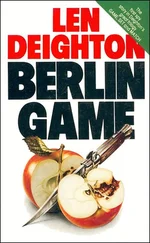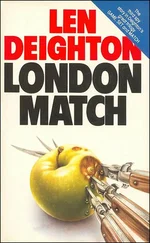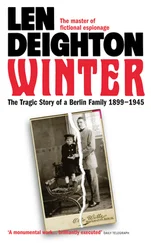Len Deighton - XPD
Здесь есть возможность читать онлайн «Len Deighton - XPD» — ознакомительный отрывок электронной книги совершенно бесплатно, а после прочтения отрывка купить полную версию. В некоторых случаях можно слушать аудио, скачать через торрент в формате fb2 и присутствует краткое содержание. Жанр: Триллер, на английском языке. Описание произведения, (предисловие) а так же отзывы посетителей доступны на портале библиотеки ЛибКат.
- Название:XPD
- Автор:
- Жанр:
- Год:неизвестен
- ISBN:нет данных
- Рейтинг книги:4 / 5. Голосов: 1
-
Избранное:Добавить в избранное
- Отзывы:
-
Ваша оценка:
- 80
- 1
- 2
- 3
- 4
- 5
XPD: краткое содержание, описание и аннотация
Предлагаем к чтению аннотацию, описание, краткое содержание или предисловие (зависит от того, что написал сам автор книги «XPD»). Если вы не нашли необходимую информацию о книге — напишите в комментариях, мы постараемся отыскать её.
XPD — читать онлайн ознакомительный отрывок
Ниже представлен текст книги, разбитый по страницам. Система сохранения места последней прочитанной страницы, позволяет с удобством читать онлайн бесплатно книгу «XPD», без необходимости каждый раз заново искать на чём Вы остановились. Поставьте закладку, и сможете в любой момент перейти на страницу, на которой закончили чтение.
Интервал:
Закладка:
‘This is Mr Stuart,’ said Wever. ‘He’s come down from London to talk to me.’ The grey, overcast sky and the tiny windows made it dark inside the kitchen. Wever pulled up a chair for Stuart and it screeched on the lino. The woman reached for the kettle. It made a loud roaring noise as she filled it from the brass tap. She placed it on the solid-fuel cooking range, lifting the stove lid so that the hot coals let a red glow strike the ceiling. She set three mugs down on the fresh newspaper which covered the big table, and dumped an almost empty bag of sugar alongside.
‘Take off your coat and sit down, Mr Stuart,’ said Wever. His voice was soft, as if he were embarrassed at the silent hostility which filled the room. The only other sound was the tick-tock of an old long-case clock.
‘Where are your children then?’ said Stuart. It was an attempt to be friendly. He took off his blue anorak and put it over the back of the chair.
‘The eldest is the second engineer on a super-tanker,’ said Wever. ‘Two daughters are married and live locally. Only the youngest is still here with us.’
‘He must have seen young Johnny’s tractor,’ said the woman, as if the visitor were not present. Her voice was hard and marked with a strong local accent.
‘My grandson,’ explained Wever. ‘He spends the day with us sometimes.’ In another voice, ‘You delivered the eggs to the Rendezvous des Gourmets, did you?’
‘They want to pay by the month. I said they would have to talk to you about it.’ She smiled. ‘They’ll never make a go of that place. They’ll be the third owners it’s had in three years. Trying to make it fancy,’ she said spitefully. ‘Trying to call it French names and serve wine. They’ll run up a bill with us and leave us without a penny if we’re not careful, Franz.’
‘They paid you?’ Wever leaned forward, loosened the laces in his heavy boots and then twisted each foot to make more space for his toes.
‘I said I’d take the eggs back if they didn’t.’ She smiled. ‘They knew I meant it. And the chickens too.’ She opened the purse which was on the table in front of her and selected some pound notes. She folded them into a tight packet and put them on the dresser, ‘That will be for the last payment on the rotovator,’ she said.
The kettle began to sing. She put water into the brown teapot, cradled it to feel its warmth and then tossed the water into the sink. The tea was measured into the pot: three people, three level spoons of tea. The boiling water sizzled as it passed over the hot metal of the kettle spout. She put a knitted cover on the teapot and reached for a jug of milk from the pantry. ‘Would you like a piece of toast, Mr Stuart?’ she said. The anticipation of the tea seemed to put her in a better mood. ‘We don’t have biscuits or any fancy cake in this house.’
‘Just tea,’ said Stuart.
The woman tipped some water into the bowl of flour and fat, and pummelled it fiercely. Then she sprinkled flour over the clean newspaper and tipped the soft pastry on to it with a loud plop. She reached for a rolling pin and began rolling the pastry. Her movements were energetic and determined, like someone completing physical exercises that she didn’t enjoy. She pursed her lips and stared down at the ever expanding sheet of cream-coloured pastry.
‘I never heard a shot fired in anger,’ said Franz Wever suddenly. ‘I wore a uniform and saluted my superiors and drew my rations, but most of the work I did in the army could have been done by a civilian.’
‘And what was that?’
‘I am a Berliner,’ said Wever. ‘I left school when I was fifteen. I learned shorthand and typing and worked in the Berlin office of the Hamburg-Amerika shipping line until I was drafted into the army. After basic training I went to the army signals school in Halle and became a teleprinter operator with Army Group 6 HQ in Hanover. I worked in that communications room for about a year. I was the only professional operator in the place-most of those kids had never even seen a teleprinter until they went to the signals school; they had to use me for anything important. Naturally I wanted to be near my parents and eventually I got a posting to the signals company of Wehrkreis III (Berlin-Brandenburg). Then I went to Zossen… ’ He raised his eyes quizzically, to see if Stuart had heard of Zossen.
‘The general staff headquarters. Its communications room handled every order the German army ever got.’
Wever nodded. ‘It was a boring job. Everything was in code… meaningless jumbles of letters and numbers. Even working for the Hamburg-Amerika line was more interesting than that.’ Wever spooned three large spoons of sugar into his empty cup. ‘Pour out the tea, Lucy. It’s brewed.’
The woman finished rolling out the pastry. Briskly she rubbed the flour from her red-knuckled hands. Then she slapped the pastry onto a dish of cooked rhubarb, cutting the overhanging edges away with deft movements of the knife. ‘Why can’t you men pour out your own tea?’ she muttered, but she did it for them. Stuart realized that what he had at first thought was hostility to him was really her response to their talk of war. It was a part of her husband she could never share-like the happy moments of some previous marriage.
‘I’ll do the milking,’ said the woman accusingly. She put the teapot back onto the warm stove. ‘Someone will have to do it before it gets dark, and you’ll be talking about the war.’ Wever did not reply. The woman climbed into a battered sheepskin coat, her movements jerky and violent as if to demonstrate her anger. She turned up her collar before facing the bad weather, and banged the door after her.
‘Sugar?’ said Wever.
‘I’m trying to lose weight,’ said Stuart.
The bag was almost empty. Wever tore it open in order to release the final grains of sugar from its folds. He tipped them into his cup with care. ‘My wife loves that clock,’ he said.
‘It’s a fine piece,’ said Stuart. It was probably the only valuable item in the entire kitchen; virtually everything else seemed improvised, plastic or broken.
‘Obsessed with it,’ explained Wever. ‘Wouldn’t hear of selling it, not even when we needed money to buy seed a couple of years ago. It belonged to her father. She nursed him through those last few months.’ There was a silence in which the tick of the clock seemed to be louder than ever. ‘Nothing is too good for that clock,’ said Wever with a brief and bitter laugh. ‘No tractor oil for that mechanism; special oil from a shop in Norwich. Only yesterday she had someone come and replace one of the chimes. It had been on order for over two months.’ He drank some of his tea but could not take his eyes off the clock. ‘I can’t stand the sound of that ticking,’ he confided. ‘And the damned thing is always slow.’
He brought out a large linen handkerchief and blew his nose with studied care. Then he drank some tea and resumed his story. ‘From Zossen I was selected for duty with the signals detachment at the Wolfsschanze. Only the very best operators were sent there,’ said Wever. Even over such a long passage of time his pride was still evident. ‘That was the Führer’s headquarters in the Görlitz forest. It was a great honour… ’ Wever wiped his nose again. ‘But I wasn’t too pleased at the time-no more weekly visits to my parents, no more cinemas, dances and all the pleasures of Berlin. The Wolfsschanze was in the middle of nowhere. The Görlitz forest is in a swampy area, sweltering hot in summer and plagued with mosquitoes; in winter it’s buried in deep snow, and in between times you get the rain and fog. My parents were pleased about it; I was made an officer soon after that, in charge of the Fernschreiberkompanien. And they were pleased because all of us permanent personnel knew we would never be sent to the Russian front.’
Читать дальшеИнтервал:
Закладка:
Похожие книги на «XPD»
Представляем Вашему вниманию похожие книги на «XPD» списком для выбора. Мы отобрали схожую по названию и смыслу литературу в надежде предоставить читателям больше вариантов отыскать новые, интересные, ещё непрочитанные произведения.
Обсуждение, отзывы о книге «XPD» и просто собственные мнения читателей. Оставьте ваши комментарии, напишите, что Вы думаете о произведении, его смысле или главных героях. Укажите что конкретно понравилось, а что нет, и почему Вы так считаете.












